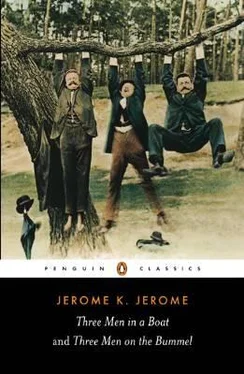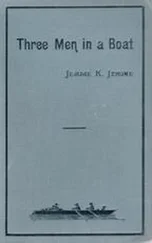Jerome Jerome - Three Men on the Bummel
Здесь есть возможность читать онлайн «Jerome Jerome - Three Men on the Bummel» весь текст электронной книги совершенно бесплатно (целиком полную версию без сокращений). В некоторых случаях можно слушать аудио, скачать через торрент в формате fb2 и присутствует краткое содержание. Жанр: Юмористическая проза, на английском языке. Описание произведения, (предисловие) а так же отзывы посетителей доступны на портале библиотеки ЛибКат.
- Название:Three Men on the Bummel
- Автор:
- Жанр:
- Год:неизвестен
- ISBN:нет данных
- Рейтинг книги:4 / 5. Голосов: 1
-
Избранное:Добавить в избранное
- Отзывы:
-
Ваша оценка:
- 80
- 1
- 2
- 3
- 4
- 5
Three Men on the Bummel: краткое содержание, описание и аннотация
Предлагаем к чтению аннотацию, описание, краткое содержание или предисловие (зависит от того, что написал сам автор книги «Three Men on the Bummel»). Если вы не нашли необходимую информацию о книге — напишите в комментариях, мы постараемся отыскать её.
Three Men on the Bummel — читать онлайн бесплатно полную книгу (весь текст) целиком
Ниже представлен текст книги, разбитый по страницам. Система сохранения места последней прочитанной страницы, позволяет с удобством читать онлайн бесплатно книгу «Three Men on the Bummel», без необходимости каждый раз заново искать на чём Вы остановились. Поставьте закладку, и сможете в любой момент перейти на страницу, на которой закончили чтение.
Интервал:
Закладка:
I wish this book to be a strict record of fact, unmarred by exaggeration, and therefore I have shown my description of this incident to Harris, lest anything beyond bald narrative may have crept into it. Harris maintains it is exaggerated, but admits that one or two people may have been "sprinkled." I have offered to turn a street hose on him at a distance of five-and-twenty yards, and take his opinion afterwards, as to whether "sprinkled" is the adequate term, but he has declined the test. Again, he insists there could not have been more than half a dozen people, at the outside, involved in the catastrophe, that forty is a ridiculous misstatement. I have offered to return with him to Hanover and make strict inquiry into the matter, and this offer he has likewise declined. Under these circumstances, I maintain that mine is a true and restrained narrative of an event that is, by a certain number of Hanoverians, remembered with bitterness unto this very day.
We left Hanover that same evening, and arrived at Berlin in time for supper and an evening stroll. Berlin is a disappointing town; its centre over-crowded, its outlying parts lifeless; its one famous street, Unter den Linden, an attempt to combine Oxford Street with the Champs Elysee, singularly unimposing, being much too wide for its size; its theatres dainty and charming, where acting is considered of more importance than scenery or dress, where long runs are unknown, successful pieces being played again and again, but never consecutively, so that for a week running you may go to the same Berlin theatre, and see a fresh play every night; its opera house unworthy of it; its two music halls, with an unnecessary suggestion of vulgarity and commonness about them, ill— arranged and much too large for comfort. In the Berlin cafes and restaurants, the busy time is from midnight on till three. Yet most of the people who frequent them are up again at seven. Either the Berliner has solved the great problem of modern life, how to do without sleep, or, with Carlyle, he must be looking forward to eternity.
Personally, I know of no other town where such late hours are the vogue, except St. Petersburg. But your St. Petersburger does not get up early in the morning. At St. Petersburg, the music halls, which it is the fashionable thing to attend AFTER the theatre-a drive to them taking half an hour in a swift sleigh-do not practically begin till twelve. Through the Neva at four o'clock in the morning you have to literally push your way; and the favourite trains for travellers are those starting about five o'clock in the morning. These trains save the Russian the trouble of getting up early. He wishes his friends "Good-night," and drives down to the station comfortably after supper, without putting the house to any inconvenience.
Potsdam, the Versailles to Berlin, is a beautiful little town, situate among lakes and woods. Here in the shady ways of its quiet, far-stretching park of Sans Souci, it is easy to imagine lean, snuffy Frederick "bummeling" with shrill Voltaire.
Acting on my advice, George and Harris consented not to stay long in Berlin; but to push on to Dresden. Most that Berlin has to show can be seen better elsewhere, and we decided to be content with a drive through the town. The hotel porter introduced us to a droschke driver, under whose guidance, so he assured us, we should see everything worth seeing in the shortest possible time. The man himself, who called for us at nine o'clock in the morning, was all that could be desired. He was bright, intelligent, and well— informed; his German was easy to understand, and he knew a little English with which to eke it out on occasion. With the man himself there was no fault to be found, but his horse was the most unsympathetic brute I have ever sat behind.
He took a dislike to us the moment he saw us. I was the first to come out of the hotel. He turned his head, and looked me up and down with a cold, glassy eye; and then he looked across at another horse, a friend of his that was standing facing him. I knew what he said. He had an expressive head, and he made no attempt to disguise his thought.
He said:
"Funny things one does come across in the summer time, don't one?"
George followed me out the next moment, and stood behind me. The horse again turned his head and looked. I have never known a horse that could twist himself as this horse did. I have seen a camelopard do trick's with his neck that compelled one's attention, but this animal was more like the thing one dreams of after a dusty days at Ascot, followed by a dinner with six old chums. If I had seen his eyes looking at me from between his own hind legs, I doubt if I should have been surprised. He seemed more amused with George if anything, than with myself. He turned to his friend again.
"Extraordinary, isn't it?" he remarked; "I suppose there must be some place where they grow them"; and then he commenced licking flies off his own left shoulder. I began to wonder whether he had lost his mother when young, and had been brought up by a cat.
George and I climbed in, and sat waiting for Harris. He came a moment later. Myself, I thought he looked rather neat. He wore a white flannel knickerbocker suit, which he had had made specially for bicycling in hot weather; his hat may have been a trifle out of the common, but it did keep the sun off.
The horse gave one look at him, said "Gott in Himmel!" as plainly as ever horse spoke, and started off down Friedrich Strasse at a brisk walk, leaving Harris and the driver standing on the pavement. His owner called to him to stop, but he took no notice. They ran after us, and overtook us at the corner of the Dorotheen Strasse. I could not catch what the man said to the horse, he spoke quickly and excitedly; but I gathered a few phrases, such as:
"Got to earn my living somehow, haven't I? Who asked for your opinion? Aye, little you care so long as you can guzzle."
The horse cut the conversation short by turning up the Dorotheen Strasse on his own account. I think what he said was:
"Come on then; don't talk so much. Let's get the job over, and, where possible, let's keep to the back streets."
Opposite the Brandenburger Thor our driver hitched the reins to the whip, climbed down, and came round to explain things to us. He pointed out the Thiergarten, and then descanted to us of the Reichstag House. He informed us of its exact height, length, and breadth, after the manner of guides. Then he turned his attention to the Gate. He said it was constructed of sandstone, in imitation of the "Properleer" in Athens.
At this point the horse, which had been occupying its leisure licking its own legs, turned round its head. It did not say anything, it just looked.
The man began again nervously. This time he said it was an imitation of the "Propeyedliar."
Here the horse proceeded up the Linden, and nothing would persuade him not to proceed up the Linden. His owner expostulated with him, but he continued to trot on. From the way he hitched his shoulders as he moved, I somehow felt he was saying:
"They've seen the Gate, haven' t they? Very well, that's enough. As for the rest, you don't know what you are talking about, and they wouldn't understand you if you did. You talk German."
It was the same throughout the length of the Linden. The horse consented to stand still sufficiently long to enable us to have a good look at each sight, and to hear the name of it. All explanation and description he cut short by the simple process of moving on.
"What these fellows want," he seemed to say to himself, "is to go home and tell people they have seen these things. If I am doing them an injustice, if they are more intelligent than they look, they can get better information than this old fool of mine is giving them from the guide book. Who wants to know how high a steeple is? You don't remember it the next five minutes when you are told, and if you do it is because you have got nothing else in your head. He just tires me with his talk. Why doesn't he hurry up, and let us all get home to lunch?"
Читать дальшеИнтервал:
Закладка:
Похожие книги на «Three Men on the Bummel»
Представляем Вашему вниманию похожие книги на «Three Men on the Bummel» списком для выбора. Мы отобрали схожую по названию и смыслу литературу в надежде предоставить читателям больше вариантов отыскать новые, интересные, ещё непрочитанные произведения.
Обсуждение, отзывы о книге «Three Men on the Bummel» и просто собственные мнения читателей. Оставьте ваши комментарии, напишите, что Вы думаете о произведении, его смысле или главных героях. Укажите что конкретно понравилось, а что нет, и почему Вы так считаете.










